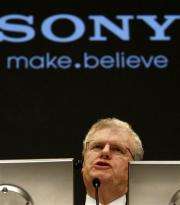Sony chief executive outlines turnaround plan

(AP) -- Sony said it aims to be profitable in gaming and flat-panel TVs by the fiscal year ending March 2011, pushing 3-D technology as a way to showcase its strength in entertainment and surface from deep losses.
"Our work is already bearing fruit," Chief Executive Howard Stringer said Thursday in outlining Sony's turnaround strategy at the electronics giant's Tokyo headquarters. "We still have more work to do."
The maker of the PlayStation 3 game console is headed for its second straight billion dollar loss in the current fiscal year ending March 2010, battered by the global slowdown and sliding prices of gadgets.
Sony Corp. has been uniting its sprawling businesses, bringing together purchasing for parts and other supplies, for instance, which had been previously divided and less efficient.
Stringer, who first promised a more nimble and streamlined Sony when he took the helm in 2005, said things would be different this time.
"This is a new Sony. The new team here is as digitally connected as our devices," he said.
Stringer said the latest restructuring was progressing ahead of schedule, resulting in a 500 billion yen ($5.6 billion) reduction in procurement costs, a 20 percent improvement from the previous fiscal year.
Job cuts were also ahead of schedule, with head count reduced by 19,500 - or 12 percent - in the last year to 146,800 in September, Stringer said.
Sony said it will aim for a 20 percent share of the global liquid-crystal display TV market by fiscal 2012.
New products in the works include 3-D TVs, targeting sales of more than 1 trillion yen ($11.2 billion) in 3-D related products by the fiscal year through March 2013. PlayStation 3 game home consoles will all be upgraded to 3-D, according to Sony.
"We see 3-D as a pillar of our strategy," said Hiroshi Yoshioka, a senior Sony executive, stressing that the whole company was rallying around 3-D. "We are all getting geared up on this theme."
But the same rivals that Sony has struggled against are certain to develop similar products since 3-D technology is not overly complex.
The big challenge for the Japanese electronics and entertainment company is coming up with a blockbuster equivalent of the iconic portable Walkman player that was a hit in Sony's 1980s heyday.
Tokyo-based Sony has fallen behind amid intensifying global competition from Apple Inc. of the U.S. with its iPod, South Korea's Samsung Electronics Co., from which Sony buys TV panels, and Japanese rival Nintendo Co., which makes the Wii.
Sony said it was going to show it was still unique by developing its own displays and batteries for cars, although the company declined to give specifics.
Stringer appointed a new management team earlier this year and promised to bring together Sony's sprawling empire spanning gaming, electronics and entertainment.
Executive Vice President Kazuo Hirai, a member of Stringer's team, showed reporters an electronic book that downloads content by wireless called Reader and a game remote-controller with a motion sensor as key products that Sony had in mind to attract consumers.
The Reader was similar to Amazon.com Inc.'s Kindle, and the remote was like the wand introduced some years ago for the Wii.
Sony has so far failed to achieve what Stringer and other executives have repeatedly promised as "synergy," to fully exploit its strength in entertainment to boost profit for its electronics business. Among Sony recording artists are Michael Jackson and Beyonce. Film hits include "Da Vinci Code" and "Spider-Man."
As entertainment moves increasingly digital and online, content ownership isn't proving to be a defining advantage, as consumers demand convenience of usage, affordability and wide range of choice for gadgets and Net-linked services.
Stringer said Sony's entertainment business was a strength in distinguishing Sony "apart from the competition," giving it an edge in Blu-ray disc format wars or delivering movies faster on networks.
A Welsh-born American and the first foreigner to head Sony, Stringer has carried out aggressive cost cuts, shutting plants, reducing suppliers and slashing jobs by the thousands.
Sony's results had been gradually recovering, when the global financial crisis and the strengthening yen struck. The Korean won hasn't strengthened to the extent the yen has, adding an extra advantage for Samsung.
Sony has recently slashed prices on its PlayStation 3 game machine ahead of the key year-end shopping season. But Nintendo and Microsoft Corp., which makes the Xbox 360, have already cut prices on their products.
Sony reported a smaller-than-expected 26.3 billion yen ($289 million) July-September loss as cost cuts combined with healthy sales of PlayStation 3 game consoles and Michael Jackson hits helped it inch toward recovery.
But it's forecasting a 95 billion yen ($1 billion) loss for the fiscal year through March 2010, marginally better than the 98.9 billion yen loss it suffered the previous fiscal year. That was Sony's first annual loss in 14 years.
©2009 The Associated Press. All rights reserved. This material may not be published, broadcast, rewritten or redistributed.



















